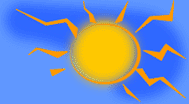|
1. Read the first paragraph. Stop reading and write what you EXPECT will be the topic and
purpose of the essay. Write your response after first paragraph.
2. Now, finish reading to the paper. Were your expectations
met? If not, what do you now think the topic, purpose and audience are?
3. What do you think is the thesis of the
essay? Is that sentence supported in the essay BY EXAMPLE? Is the sentence itself a strong statement (not a quote from someone
else, not a question, etc.)?
4. Note all the examples you find; these could be whole paragraphs or just single sentences.
Evaluate its usefulness or strength in supporting the essay.
5. What did you like best about the essay? BE SPECIFIC
6. What did you like the least about the essay? BE SPECIFIC AND GIVE SUGGESTIONS FOR IMPROVEMENT
7. Did anything
in the essay surprise you? Be specific!
8. What TWO features of the essay most need improvement? Add a comment/suggestion
about what/how they could be improved. Remember that just marking a problem area without explanation won't help the author
fix the problem.
|
|
|
|
 |
|
|
The best option is to apply these questions
to your own writing as you are completing it. As you look at others' works, you will discover that you know more about writing
than perhaps you have given yourself credit for. Even if you don't consider yourself an "expert" in English or writing, you
could not be in ENG 101 unless you have met certain requirements--you are therefore "expert enough" to respond to these questions
regarding something that you have read.
|
